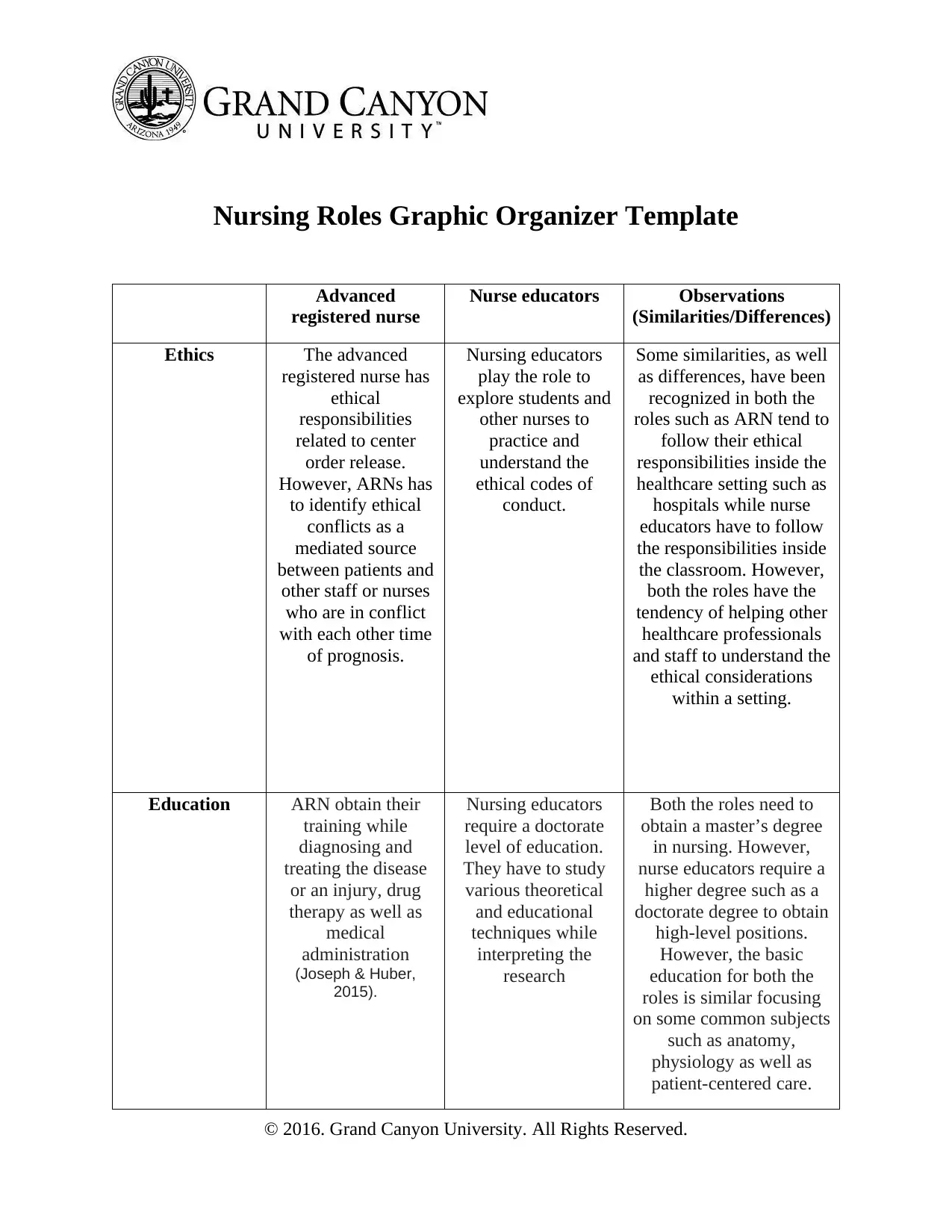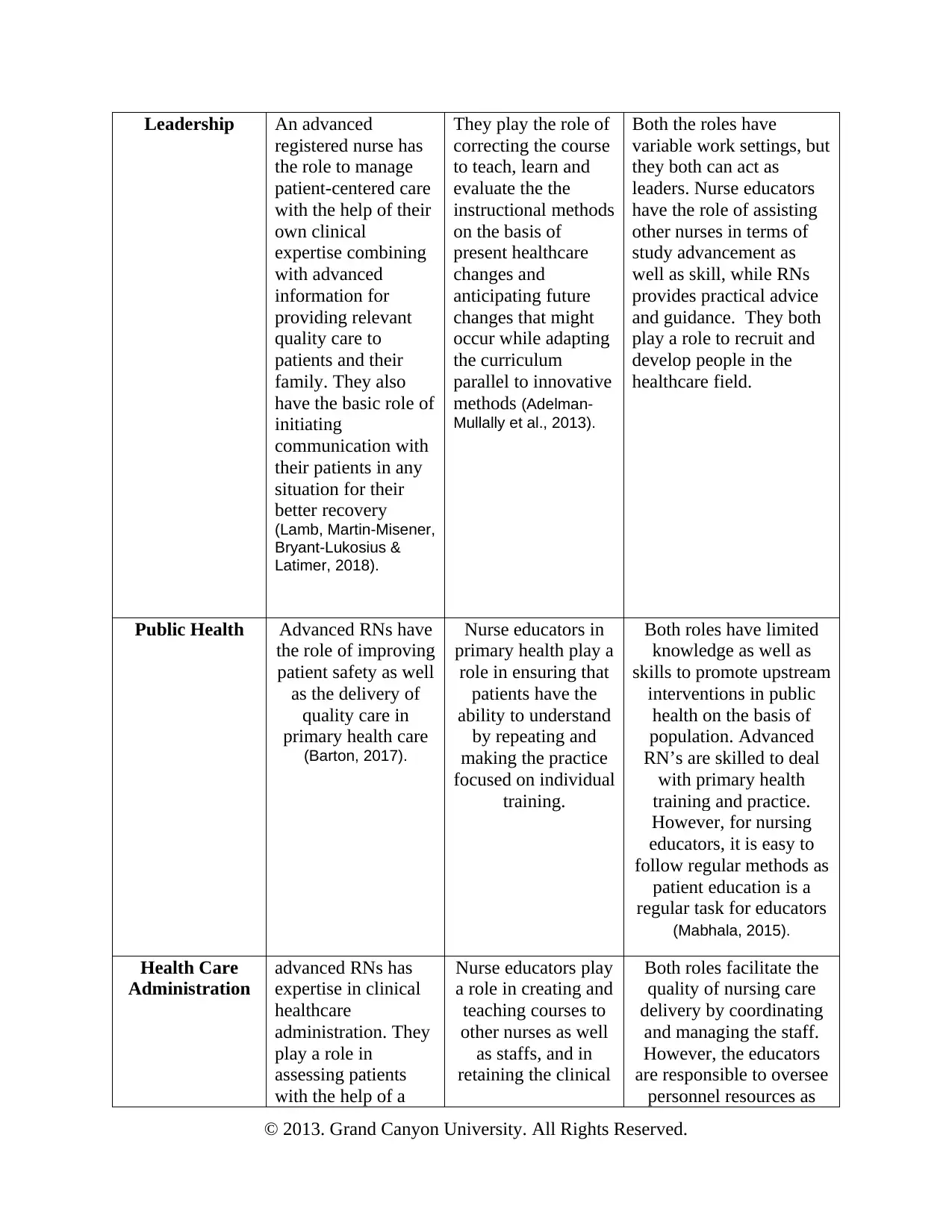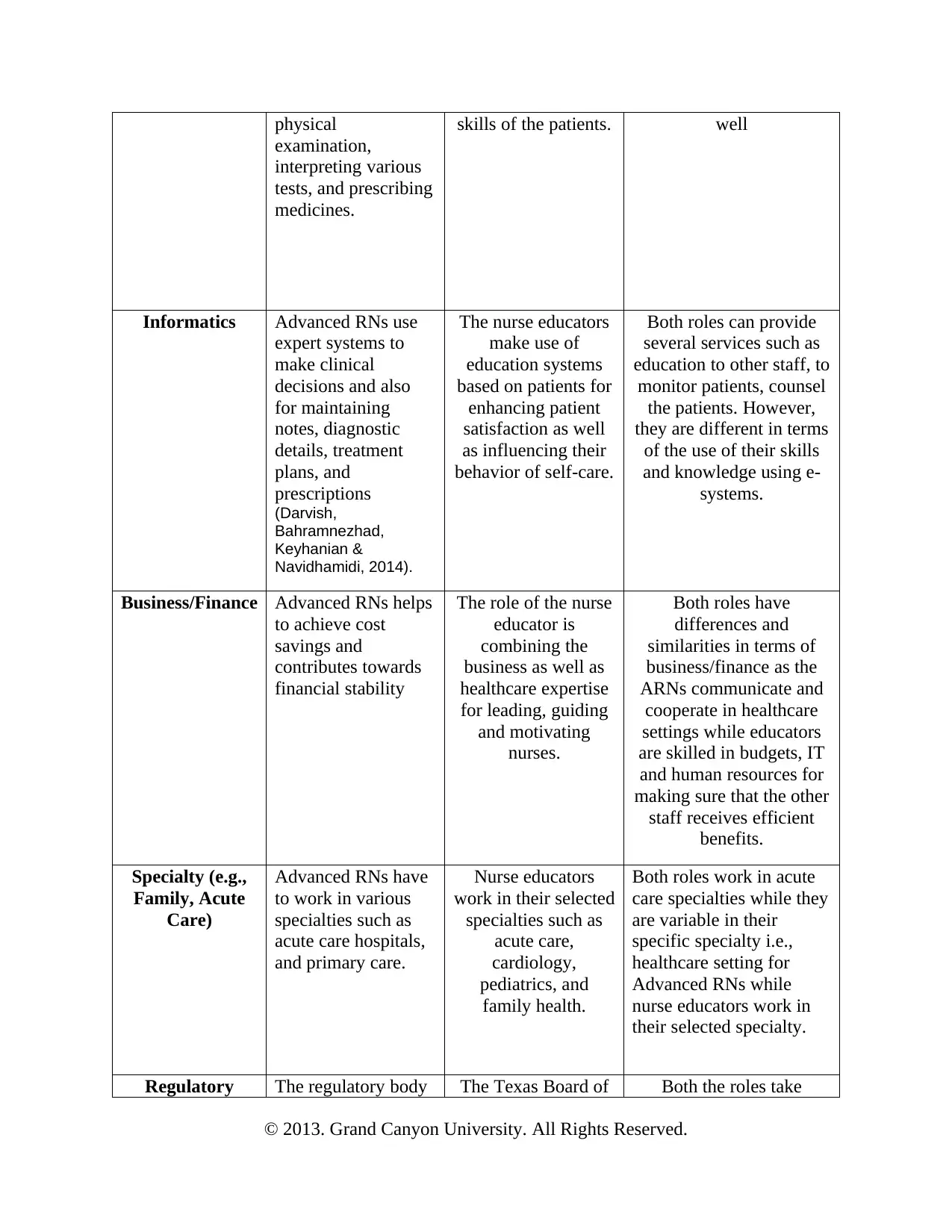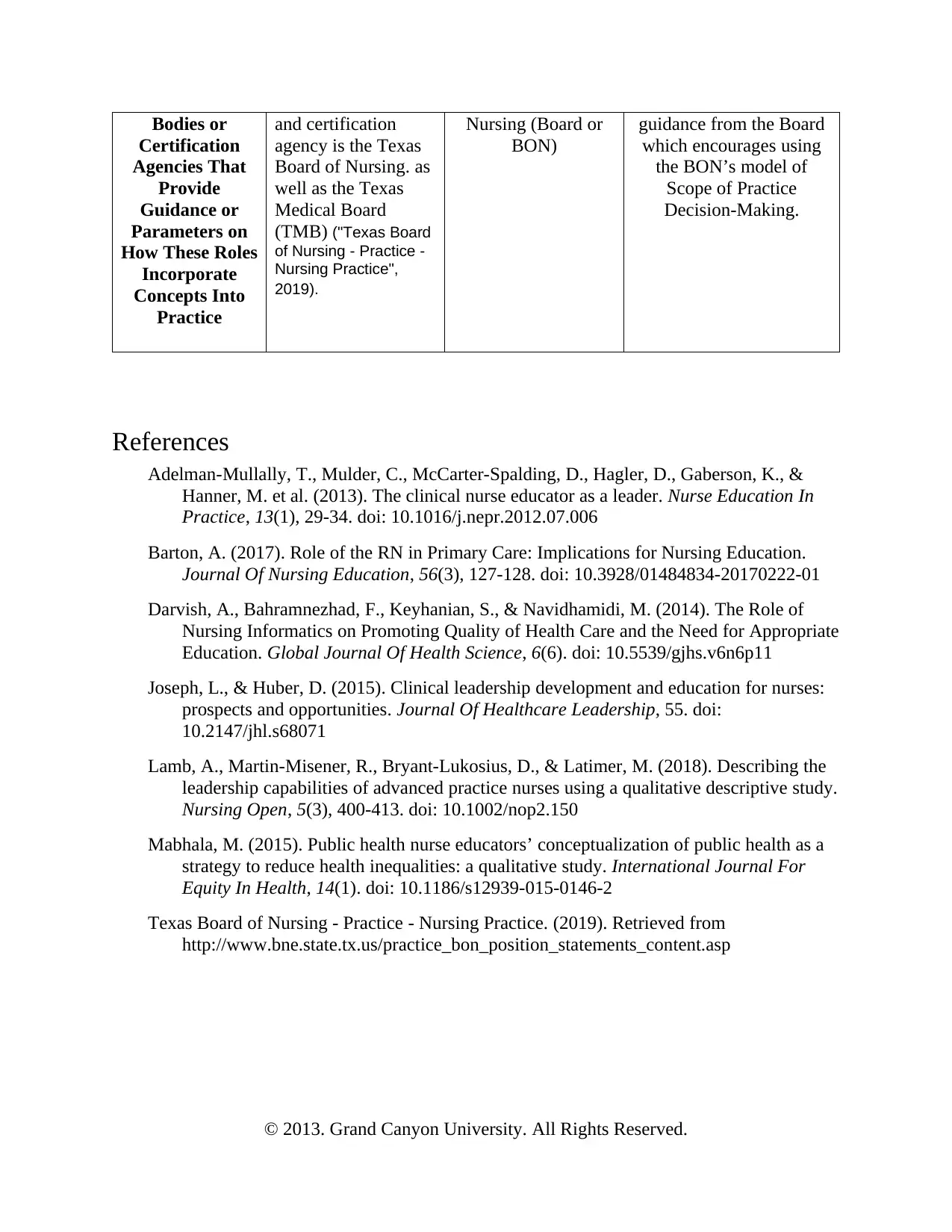Nursing Roles: Comparing Advanced Registered Nurse and Educator Roles
VerifiedAdded on 2023/01/05
|4
|1311
|1
Homework Assignment
AI Summary
This assignment provides a comprehensive comparison of two key nursing roles: the Advanced Registered Nurse (ARN) and the Nurse Educator. The comparison is structured using a graphic organizer format, exploring similarities and differences across several key areas. These areas include ethics, education, leadership, public health, healthcare administration, business/finance, and specialty. The document examines ethical responsibilities, educational requirements, leadership styles, and the impact of each role within various healthcare settings. It also touches upon regulatory bodies and certification agencies that influence these roles, providing a well-rounded overview of both the ARN and Nurse Educator positions, supported by cited references.

Nursing Roles Graphic Organizer Template
Advanced
registered nurse
Nurse educators Observations
(Similarities/Differences)
Ethics The advanced
registered nurse has
ethical
responsibilities
related to center
order release.
However, ARNs has
to identify ethical
conflicts as a
mediated source
between patients and
other staff or nurses
who are in conflict
with each other time
of prognosis.
Nursing educators
play the role to
explore students and
other nurses to
practice and
understand the
ethical codes of
conduct.
Some similarities, as well
as differences, have been
recognized in both the
roles such as ARN tend to
follow their ethical
responsibilities inside the
healthcare setting such as
hospitals while nurse
educators have to follow
the responsibilities inside
the classroom. However,
both the roles have the
tendency of helping other
healthcare professionals
and staff to understand the
ethical considerations
within a setting.
Education ARN obtain their
training while
diagnosing and
treating the disease
or an injury, drug
therapy as well as
medical
administration
(Joseph & Huber,
2015).
Nursing educators
require a doctorate
level of education.
They have to study
various theoretical
and educational
techniques while
interpreting the
research
Both the roles need to
obtain a master’s degree
in nursing. However,
nurse educators require a
higher degree such as a
doctorate degree to obtain
high-level positions.
However, the basic
education for both the
roles is similar focusing
on some common subjects
such as anatomy,
physiology as well as
patient-centered care.
© 2016. Grand Canyon University. All Rights Reserved.
Advanced
registered nurse
Nurse educators Observations
(Similarities/Differences)
Ethics The advanced
registered nurse has
ethical
responsibilities
related to center
order release.
However, ARNs has
to identify ethical
conflicts as a
mediated source
between patients and
other staff or nurses
who are in conflict
with each other time
of prognosis.
Nursing educators
play the role to
explore students and
other nurses to
practice and
understand the
ethical codes of
conduct.
Some similarities, as well
as differences, have been
recognized in both the
roles such as ARN tend to
follow their ethical
responsibilities inside the
healthcare setting such as
hospitals while nurse
educators have to follow
the responsibilities inside
the classroom. However,
both the roles have the
tendency of helping other
healthcare professionals
and staff to understand the
ethical considerations
within a setting.
Education ARN obtain their
training while
diagnosing and
treating the disease
or an injury, drug
therapy as well as
medical
administration
(Joseph & Huber,
2015).
Nursing educators
require a doctorate
level of education.
They have to study
various theoretical
and educational
techniques while
interpreting the
research
Both the roles need to
obtain a master’s degree
in nursing. However,
nurse educators require a
higher degree such as a
doctorate degree to obtain
high-level positions.
However, the basic
education for both the
roles is similar focusing
on some common subjects
such as anatomy,
physiology as well as
patient-centered care.
© 2016. Grand Canyon University. All Rights Reserved.
Paraphrase This Document
Need a fresh take? Get an instant paraphrase of this document with our AI Paraphraser

Leadership An advanced
registered nurse has
the role to manage
patient-centered care
with the help of their
own clinical
expertise combining
with advanced
information for
providing relevant
quality care to
patients and their
family. They also
have the basic role of
initiating
communication with
their patients in any
situation for their
better recovery
(Lamb, Martin-Misener,
Bryant-Lukosius &
Latimer, 2018).
They play the role of
correcting the course
to teach, learn and
evaluate the the
instructional methods
on the basis of
present healthcare
changes and
anticipating future
changes that might
occur while adapting
the curriculum
parallel to innovative
methods (Adelman-
Mullally et al., 2013).
Both the roles have
variable work settings, but
they both can act as
leaders. Nurse educators
have the role of assisting
other nurses in terms of
study advancement as
well as skill, while RNs
provides practical advice
and guidance. They both
play a role to recruit and
develop people in the
healthcare field.
Public Health Advanced RNs have
the role of improving
patient safety as well
as the delivery of
quality care in
primary health care
(Barton, 2017).
Nurse educators in
primary health play a
role in ensuring that
patients have the
ability to understand
by repeating and
making the practice
focused on individual
training.
Both roles have limited
knowledge as well as
skills to promote upstream
interventions in public
health on the basis of
population. Advanced
RN’s are skilled to deal
with primary health
training and practice.
However, for nursing
educators, it is easy to
follow regular methods as
patient education is a
regular task for educators
(Mabhala, 2015).
Health Care
Administration
advanced RNs has
expertise in clinical
healthcare
administration. They
play a role in
assessing patients
with the help of a
Nurse educators play
a role in creating and
teaching courses to
other nurses as well
as staffs, and in
retaining the clinical
Both roles facilitate the
quality of nursing care
delivery by coordinating
and managing the staff.
However, the educators
are responsible to oversee
personnel resources as
© 2013. Grand Canyon University. All Rights Reserved.
registered nurse has
the role to manage
patient-centered care
with the help of their
own clinical
expertise combining
with advanced
information for
providing relevant
quality care to
patients and their
family. They also
have the basic role of
initiating
communication with
their patients in any
situation for their
better recovery
(Lamb, Martin-Misener,
Bryant-Lukosius &
Latimer, 2018).
They play the role of
correcting the course
to teach, learn and
evaluate the the
instructional methods
on the basis of
present healthcare
changes and
anticipating future
changes that might
occur while adapting
the curriculum
parallel to innovative
methods (Adelman-
Mullally et al., 2013).
Both the roles have
variable work settings, but
they both can act as
leaders. Nurse educators
have the role of assisting
other nurses in terms of
study advancement as
well as skill, while RNs
provides practical advice
and guidance. They both
play a role to recruit and
develop people in the
healthcare field.
Public Health Advanced RNs have
the role of improving
patient safety as well
as the delivery of
quality care in
primary health care
(Barton, 2017).
Nurse educators in
primary health play a
role in ensuring that
patients have the
ability to understand
by repeating and
making the practice
focused on individual
training.
Both roles have limited
knowledge as well as
skills to promote upstream
interventions in public
health on the basis of
population. Advanced
RN’s are skilled to deal
with primary health
training and practice.
However, for nursing
educators, it is easy to
follow regular methods as
patient education is a
regular task for educators
(Mabhala, 2015).
Health Care
Administration
advanced RNs has
expertise in clinical
healthcare
administration. They
play a role in
assessing patients
with the help of a
Nurse educators play
a role in creating and
teaching courses to
other nurses as well
as staffs, and in
retaining the clinical
Both roles facilitate the
quality of nursing care
delivery by coordinating
and managing the staff.
However, the educators
are responsible to oversee
personnel resources as
© 2013. Grand Canyon University. All Rights Reserved.

physical
examination,
interpreting various
tests, and prescribing
medicines.
skills of the patients. well
Informatics Advanced RNs use
expert systems to
make clinical
decisions and also
for maintaining
notes, diagnostic
details, treatment
plans, and
prescriptions
(Darvish,
Bahramnezhad,
Keyhanian &
Navidhamidi, 2014).
The nurse educators
make use of
education systems
based on patients for
enhancing patient
satisfaction as well
as influencing their
behavior of self-care.
Both roles can provide
several services such as
education to other staff, to
monitor patients, counsel
the patients. However,
they are different in terms
of the use of their skills
and knowledge using e-
systems.
Business/Finance Advanced RNs helps
to achieve cost
savings and
contributes towards
financial stability
The role of the nurse
educator is
combining the
business as well as
healthcare expertise
for leading, guiding
and motivating
nurses.
Both roles have
differences and
similarities in terms of
business/finance as the
ARNs communicate and
cooperate in healthcare
settings while educators
are skilled in budgets, IT
and human resources for
making sure that the other
staff receives efficient
benefits.
Specialty (e.g.,
Family, Acute
Care)
Advanced RNs have
to work in various
specialties such as
acute care hospitals,
and primary care.
Nurse educators
work in their selected
specialties such as
acute care,
cardiology,
pediatrics, and
family health.
Both roles work in acute
care specialties while they
are variable in their
specific specialty i.e.,
healthcare setting for
Advanced RNs while
nurse educators work in
their selected specialty.
Regulatory The regulatory body The Texas Board of Both the roles take
© 2013. Grand Canyon University. All Rights Reserved.
examination,
interpreting various
tests, and prescribing
medicines.
skills of the patients. well
Informatics Advanced RNs use
expert systems to
make clinical
decisions and also
for maintaining
notes, diagnostic
details, treatment
plans, and
prescriptions
(Darvish,
Bahramnezhad,
Keyhanian &
Navidhamidi, 2014).
The nurse educators
make use of
education systems
based on patients for
enhancing patient
satisfaction as well
as influencing their
behavior of self-care.
Both roles can provide
several services such as
education to other staff, to
monitor patients, counsel
the patients. However,
they are different in terms
of the use of their skills
and knowledge using e-
systems.
Business/Finance Advanced RNs helps
to achieve cost
savings and
contributes towards
financial stability
The role of the nurse
educator is
combining the
business as well as
healthcare expertise
for leading, guiding
and motivating
nurses.
Both roles have
differences and
similarities in terms of
business/finance as the
ARNs communicate and
cooperate in healthcare
settings while educators
are skilled in budgets, IT
and human resources for
making sure that the other
staff receives efficient
benefits.
Specialty (e.g.,
Family, Acute
Care)
Advanced RNs have
to work in various
specialties such as
acute care hospitals,
and primary care.
Nurse educators
work in their selected
specialties such as
acute care,
cardiology,
pediatrics, and
family health.
Both roles work in acute
care specialties while they
are variable in their
specific specialty i.e.,
healthcare setting for
Advanced RNs while
nurse educators work in
their selected specialty.
Regulatory The regulatory body The Texas Board of Both the roles take
© 2013. Grand Canyon University. All Rights Reserved.
⊘ This is a preview!⊘
Do you want full access?
Subscribe today to unlock all pages.

Trusted by 1+ million students worldwide

Bodies or
Certification
Agencies That
Provide
Guidance or
Parameters on
How These Roles
Incorporate
Concepts Into
Practice
and certification
agency is the Texas
Board of Nursing. as
well as the Texas
Medical Board
(TMB) ("Texas Board
of Nursing - Practice -
Nursing Practice",
2019).
Nursing (Board or
BON)
guidance from the Board
which encourages using
the BON’s model of
Scope of Practice
Decision-Making.
References
Adelman-Mullally, T., Mulder, C., McCarter-Spalding, D., Hagler, D., Gaberson, K., &
Hanner, M. et al. (2013). The clinical nurse educator as a leader. Nurse Education In
Practice, 13(1), 29-34. doi: 10.1016/j.nepr.2012.07.006
Barton, A. (2017). Role of the RN in Primary Care: Implications for Nursing Education.
Journal Of Nursing Education, 56(3), 127-128. doi: 10.3928/01484834-20170222-01
Darvish, A., Bahramnezhad, F., Keyhanian, S., & Navidhamidi, M. (2014). The Role of
Nursing Informatics on Promoting Quality of Health Care and the Need for Appropriate
Education. Global Journal Of Health Science, 6(6). doi: 10.5539/gjhs.v6n6p11
Joseph, L., & Huber, D. (2015). Clinical leadership development and education for nurses:
prospects and opportunities. Journal Of Healthcare Leadership, 55. doi:
10.2147/jhl.s68071
Lamb, A., Martin-Misener, R., Bryant-Lukosius, D., & Latimer, M. (2018). Describing the
leadership capabilities of advanced practice nurses using a qualitative descriptive study.
Nursing Open, 5(3), 400-413. doi: 10.1002/nop2.150
Mabhala, M. (2015). Public health nurse educators’ conceptualization of public health as a
strategy to reduce health inequalities: a qualitative study. International Journal For
Equity In Health, 14(1). doi: 10.1186/s12939-015-0146-2
Texas Board of Nursing - Practice - Nursing Practice. (2019). Retrieved from
http://www.bne.state.tx.us/practice_bon_position_statements_content.asp
© 2013. Grand Canyon University. All Rights Reserved.
Certification
Agencies That
Provide
Guidance or
Parameters on
How These Roles
Incorporate
Concepts Into
Practice
and certification
agency is the Texas
Board of Nursing. as
well as the Texas
Medical Board
(TMB) ("Texas Board
of Nursing - Practice -
Nursing Practice",
2019).
Nursing (Board or
BON)
guidance from the Board
which encourages using
the BON’s model of
Scope of Practice
Decision-Making.
References
Adelman-Mullally, T., Mulder, C., McCarter-Spalding, D., Hagler, D., Gaberson, K., &
Hanner, M. et al. (2013). The clinical nurse educator as a leader. Nurse Education In
Practice, 13(1), 29-34. doi: 10.1016/j.nepr.2012.07.006
Barton, A. (2017). Role of the RN in Primary Care: Implications for Nursing Education.
Journal Of Nursing Education, 56(3), 127-128. doi: 10.3928/01484834-20170222-01
Darvish, A., Bahramnezhad, F., Keyhanian, S., & Navidhamidi, M. (2014). The Role of
Nursing Informatics on Promoting Quality of Health Care and the Need for Appropriate
Education. Global Journal Of Health Science, 6(6). doi: 10.5539/gjhs.v6n6p11
Joseph, L., & Huber, D. (2015). Clinical leadership development and education for nurses:
prospects and opportunities. Journal Of Healthcare Leadership, 55. doi:
10.2147/jhl.s68071
Lamb, A., Martin-Misener, R., Bryant-Lukosius, D., & Latimer, M. (2018). Describing the
leadership capabilities of advanced practice nurses using a qualitative descriptive study.
Nursing Open, 5(3), 400-413. doi: 10.1002/nop2.150
Mabhala, M. (2015). Public health nurse educators’ conceptualization of public health as a
strategy to reduce health inequalities: a qualitative study. International Journal For
Equity In Health, 14(1). doi: 10.1186/s12939-015-0146-2
Texas Board of Nursing - Practice - Nursing Practice. (2019). Retrieved from
http://www.bne.state.tx.us/practice_bon_position_statements_content.asp
© 2013. Grand Canyon University. All Rights Reserved.
1 out of 4
Related Documents
Your All-in-One AI-Powered Toolkit for Academic Success.
+13062052269
info@desklib.com
Available 24*7 on WhatsApp / Email
![[object Object]](/_next/static/media/star-bottom.7253800d.svg)
Unlock your academic potential
Copyright © 2020–2026 A2Z Services. All Rights Reserved. Developed and managed by ZUCOL.





